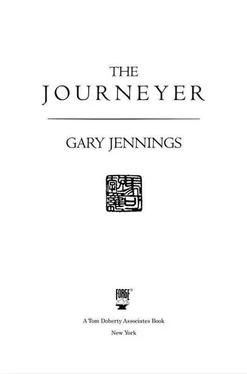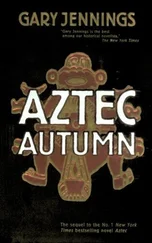A German company has recently opened a branch manufactory here in Venice, producing a newly perfected sort of looking glass, and they sell every one they make, and no fashionable Venetian household, including ours, can be without one or two of those. I admire the lucent mirrors and the undistorted reflections they provide, but I consider them also a mixed blessing. I should prefer to believe that what I see when I look into a glass is blamable on imperfection and distortion, rather than have to concede that I am seeing what I really look like. The now totally gray beard and the thinning gray hair, the wrinkles and liverish skin splotches, the dispirited pouches under eyes that are now bleared and dimmed …
“No need to have dim eyes, friend Marco,” said Dotòr Abano, who has been our family physician all these years, and who is as old as I am. “Those ingenious Germans have created another marvel of glass. They call this device the Brille—occhiale, if you prefer. The two glass pieces in it do wonders for the eyesight. Merely hold the thing up before your face and look at this page of writing. Is it not clearer to read? Now look at yourself in the mirror.”
I did, and murmured, “Once, in a harsh wintertime, at a place called Urumqi, I saw some savage-looking men come out of the frozen Gobi, and they frightened me to terror, for they all had great gleaming eyes of copper. When they got nearer, I saw that they were each wearing a device rather like this. A sort of dòmino mask made of thin copper and pierced with many pinholes. A man could not see very well through the thing, but they said it protected them from going blind in the snow glare.”
“Yes, yes,” Abano said impatiently. “You have told me more than once about the men with the copper eyes. But what do you think of the occhiale? Cannot you see more vividly?”
“Yes,” I said, but not very enthusiastically, for what I was seeing was myself in the mirror. “I am noticing something I never noticed before. You are a mèdego, Abano. Is there a medical reason to account for my losing the hair from the top of my head but simultaneously growing bristles on the point of my nose ?”
Still impatiently, he said, “The recondite medical term for that is ‘old age.’ Well, what of the occhiale? I can order a device made especially for you. Plain or ornate, made for holding in the hand or strapping around the head, gem-inlaid wood or tooled leather—”
“Thank you, old friend, but I think not,” I said, laying down the mirror and giving him back the apparatus. “I have seen much in my lifetime. It might be a mercy now not to see all the signs of decay.”
Just today, I realized that this is the twentieth day of the month of September. My birthday. I am no longer in my sixty-fifth year. I have this day tottered across the invisible but all too distinct line into my sixty-sixth. The realization bowed me down for a moment, but I raised myself to my fullest height—ignoring the twinge in my lower back—and squared my shoulders. Determined not to wallow in a maudlin mood of self-pity, thinking to cheer myself up, I ambled into the kitchen and leaned on the chopping block while our cook bustled about at her work, and I said conversationally:
“Nastàsia, I will tell you an improving and edifying tale. About this time every year, in the Kithai and Manzi lands, the Han people celebrate what they call the Moon Cake Festa. It is a warm and loving family holiday, nothing grandiose. The families simply gather affectionately together and enjoy the eating of Moon Cakes. Those are small, round pastries, heavy with richness and very tasty. I will tell you how they are made, and perhaps you would oblige me by making some, and the Dona and the Damìne and I could pretend we are celebrating in the Han manner. You take nuts and dates and cinnamon and—”
And almost immediately I was out of the kitchen and careering about the house in search of Donata. I found her in her dressing chamber, doing needlework, and I bellowed:
“I have just been expelled from my own kitchen by my own cook!”
Donata, not looking up, said with mild reproof, “Have you been bothering Nata again?”
“Bothering her, indeed! Is she employed to serve us or is she not? The woman had the effrontery to complain that she is tired of hearing of the sumptuous viands I used to enjoy abroad, and she will hear not another word about them! Che braga! Is that any way for a domestic to speak to her own master?”
Donata clucked sympathetically. I stumped about the room for a bit, peevishly kicking things that got in my way. Then I resumed, and tragically:
“Our domestics, the Dogaressa, even my fellows on the Rialto, they all seem disinclined nowadays to learn anything. They wish only to stagnate, and not to be stirred or leavened out of their stagnation. Mind you, Donata, I do not much care about outsiders, but my own daughters! My own daughters heave sighs and drum their fingers and look out the window when I try to relate some improving and edifying tale from which they might derive great benefit. Are you by any chance encouraging this disrespect for the patriarch of the family? I think it is reprehensible. I begin to feel like that prophet of whom Jesus spoke—the one who was not without honor, save in his own country and in his own house.”
Donata sat smiling through my tirade, and imperturbably plying her needle, and when I was out of breath she said, “The girls are young. Young folk often find us older folk tiresome.”
I roved about the room some more, until my wheezing abated. Then I said, “Old. Yes. Behold us dismal old folk. At least I can claim that I got old in the ordinary way, through the accumulation of years. But you did not have to, Donata.”
“Everybody gets old,” she said placidly.
“You are just about exactly the same age now, Donata, as I was on our wedding day. Was I old then?”
“You were in your prime of life. Stalwart and handsome. But women age differently than men do.”
“Not if they do not wish to. You only desired to hasten past the childbearing years. And you need not have done. I told you long ago that I knew simple things that would prevent—”
“Things not fit to be mentioned by a Christian tongue, or heard by Christian ears. I do not wish to hear them now, any more than I did then.”
“If you had listened then,” I said accusingly, “you would not now be an Autumn Fan.”
“A what?” she said, looking up at me for the first time.
“It is a very descriptive term the Han have. An Autumn Fan means a woman past her years of appeal and attractiveness. You see, in the autumn the air is cool and there is no necessity for a fan. It becomes an object without use or purpose or reason for existence. Just so, a woman who has ceased to be womanly, as you deliberately did, solely to avoid having more children—”
“All these years,” she interrupted, but in a very soft voice. “All these years, have you thought that was why?”
I stopped, with my mouth still open. She laid down her needlework on her black bombazine lap, and folded her yellowed hands atop it, and fixed me with the faded eyes that had once been bright blue, and said:
“I ceased being a woman when I could no longer deceive myself. When I wearied of pretending to myself that you loved me.”
I blinked in bewilderment and disbelief, and had to grope for my voice. “Donata, was I ever anything but tender and caring? Did I fail you in any way? Was I ever less than a good husband?”
“There. Even now you do not speak the word.”
“I thought it was implicit. I am sorry. Very well, then. I did love you.”
“There was something or someone you loved more, and always have. At our closest, Marco, we were never close. I could look into your face and see only distance, far distance. Was it farness of miles or of years? Was it another woman? God forgive me for believing this, but … was it not my mother?”
Читать дальше












